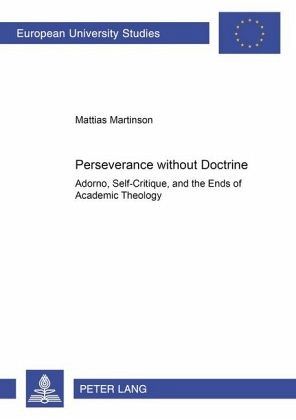Nicht lieferbar

Perseverance without Doctrine
Adorno, Self-Critique, and the Ends of Academic Theology. Dissertationsschrift
Versandkostenfrei!
Nicht lieferbar
Academic theology faces crucial difficulties in the secular situation. Can a broad theological field be kept together in one scientific and educational framework today, or is the idea of a theological faculty to be abandoned? This study investigates the idea of an autonomous academic theology, and tries to give reasons for its continuation. The author makes use of Theodor W. Adorno's multifaceted critical theory to formulate a notion of theology that challenges the idea of academic theology as an exclusively Christian endeavor, but also the idea implying that such a theology either has to be a...
Academic theology faces crucial difficulties in the secular situation. Can a broad theological field be kept together in one scientific and educational framework today, or is the idea of a theological faculty to be abandoned? This study investigates the idea of an autonomous academic theology, and tries to give reasons for its continuation. The author makes use of Theodor W. Adorno's multifaceted critical theory to formulate a notion of theology that challenges the idea of academic theology as an exclusively Christian endeavor, but also the idea implying that such a theology either has to be assimilated with other disciplines or migrate from the secular academy into the realm of the Church. In dialogue with Adorno the notion of intellectual self-critique is put forward as a principle in terms of which theology can be seen as one among other secular forces in the establishment of academic rationality. The academy is viewed as a force field in which the battle about democracy and enlightenment is taking place. To view theology as self-critique is thus ultimately an attempt to enable a serious theological participation in the general debate on the dialectics of secular society.



